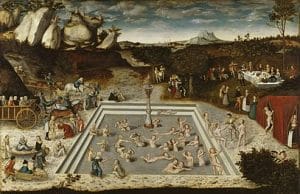Legend has it that the Spanish explorer Juan Ponce de León stumbled upon Florida while searching for the Fountain of Youth. The mythical spring would restore youth to anyone who drank or bathed in its waters. His personal records make no mention of his search, but nevertheless popular history has attached the fountain to his name, often as evidence of a backward time. But if we replace magical fountains with technology, then the quest at least, does not seem so doltish. The fountain may not exist, but the desire to remain forever young remains a part of the human psyche. Mass vanity? Perhaps. But if we dismiss the desire too quickly, then we are in danger of missing a message from our hearts that points towards the One Who is the fulfillment of every desire.
A quick word first about vanity. Vanity or vainglory is not wrong because it seeks glory. We were made to receive glory. Vainglory is wrong because it seeks glory in the wrong things, in the wrong way or from the wrong person. Glory is meant to be received from God in reward for the good that we do for the right reason. To seek it in other ways is ultimately empty and unsatisfying and thus leaves us perpetually searching for what ultimately proves to be a mythical satisfaction.
St. Thomas on Perpetual Youth
Reading St. Thomas’ Summa Theologiae can be intimidating, but those who are willing to brave the raging intellectual waters are often struck by his common sense. Related to the topic at hand, he takes a common sense approach about the state of our bodies after the general resurrection. Building off the promise in Ephesians 4:13, namely “until we all attain to…mature manhood, to the extent of the full stature of Christ”, St. Thomas points out that man will rise again at the most perfect stage of nature (ST III, q.81, art.1). Because perfection does not come to us all at once, there is a defect in human nature in time. First there is the defect of childhood in that they lack maturity and bodily strength. Secondly there is a defect in old age brought about by the diminishment of bodily strength and faculties. These two defects meet at a single point in which growth terminates and just prior to the movement towards defect begins. This point, St. Thomas calls a “youthful age” and it is when we are at our strongest bodily. This is the same youthful age that the Fountain of Youth is attempting to capture. It is the same age that the bodily resurrection will capture for all eternity. This desire in our culture to stay forever young is really a twisted-up desire for our bodily resurrection in which we will attain to “the extent of the full stature of Christ.”
Because Christ Himself rose at the youthful age of 30, and our resurrection is a share in His, we will all arise in our bodies of a similar youthful age. But, before closing, we would be remiss if we merely glossed over the fact that Christ was struck down at what would be considered the strongest age. This ought to bring both pause and praise because the age in which He was strongest was also the age at which He could suffer the most. To cut a man down in His prime requires the greatest effort. His gift of self to mankind was more complete at 30 than it would have been at any other age and helps explain why it was fitting that He be that age.

The desire for perpetual youth in this world is vanity, not because it seeks the glory that comes in youth, but because it seeks it in the wrong way. The desire is a pointer that extends beyond this world to tell us that it is only by dying to self with a youthful vigor that we can actually become younger. Perpetual youth only comes from the One Who won it for us by giving Himself away during His youth. Fully untwisted, the Fountain of Youth and all its present day manifestations become a true north for us to fix our desire on its proper object. Only by sharing in Christ’s passion do we share in His youthful resurrection.
